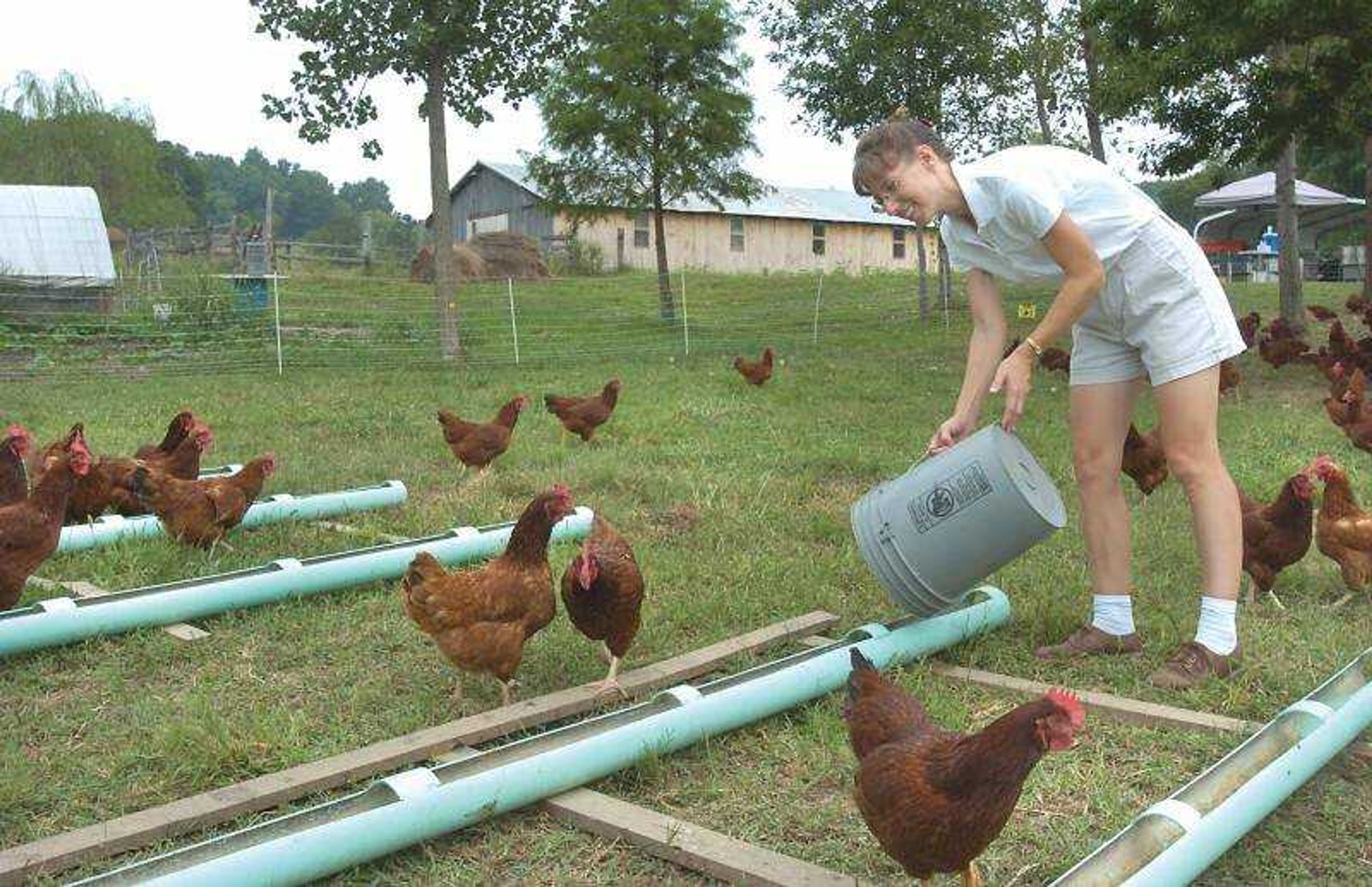Gone green
Who moves 650 miles from their home to start a farm after reading a single book on chickens? It's a question Matthew and Rachel Fasnacht haven't had too much time to ponder in the last three years. Somehow, the former Minnesotans are here in Southeast Missouri, living among not only 400 chickens but turkey, cattle, pigs and bees...
Who moves 650 miles from their home to start a farm after reading a single book on chickens?
It's a question Matthew and Rachel Fasnacht haven't had too much time to ponder in the last three years.
Somehow, the former Minnesotans are here in Southeast Missouri, living among not only 400 chickens but turkey, cattle, pigs and bees.
"We're kind of go-getters, so we decided if we're going to farm, then we're going to just do it," says Rachel.
They're one of a handful of local farm operations using organic methods, the backbone of a fast-moving trend that has Americans thinking about more than gasoline when it comes to "going green."
According to the Missouri Department of Agriculture, the organic industry has increased 20 percent or more annually beginning in the 1990s.
The organic food sections in local grocery stores are growing larger -- more than 73 percent of all grocery stores carry organic foods now, according to the Department of Agriculture. Southeast Missouri restaurants proudly proclaim when their dishes are served up with organic products. While the U.S. Department of Agriculture doesn't claim organically produced food is safer or more nutritious than the conventional kind, more and more families are flocking around organically topped tables.
The reason comes down to better education, says Bishop Charlie Green Jr. of Green Memorial Church, who also serves as southeast regional director for the Missouri Organic Association.
"In the last seven years I've noticed people across the nation becoming more concerned about their health and what they eat," says Green, who lives in Sikeston. "And as they become educated, they're choosing organic."
The goal of the Missouri Organic Association, which formed in the early 1990s, is to help network growers and consumers interested in organic products and educate the public on organic foods.
Linda Williams, a Farmington, Mo., organic grower and president of MOA, said the organization has attracted a growing number of consumers in recent years. In the east-central region where she lives, membership is about 50 percent growers and 50 percent consumers.
"There are a lot more people who are simply joining to support us as a show of strength," Williams said.
There are about 300 MOA members statewide.
Farming Web site www.localharvest.com lists three "organic" farms in Cape Girardeau County -- the Fasnachts' Family Friendly Farms, the neighboring Janzow Farms and ShowMe Fresh Farm -- though technically none of the three is certified as organic. In 2005, the Department of Agriculture eliminates its organic certification program as part of state budget cuts. Without state certification, organic farmers must turn to private organizations, which are more expensive. Organic farmers in Southeast Missouri have simply forgone certification, which means they can't technically claim to have organic products.
Three years ago, when the Fasnachts began Family Friendly Farms in Cape Girardeau County, they decided to use as many organic products and processes as the area would allow. It's not easy in Southeast Missouri, says Rachel, because organic grains and other animal food are not available locally and trucking it in from outside the area is too expensive.
So while Family Friendly Farms isn't certified as organic, the owners take an organic stance on many farm issues -- like using natural remedies for animal illnesses, not feeding animals low-level antibiotics in their food and not using insecticides. They also use subscribe to a concept called sustainable farming, which focuses on putting as much back into the soil as is taken out.
The evidence of their success is all around, says Rachel, pointing out the green grass that has taken the place of weeds in the last three years.
There is a science to farming, and the Fasnachts have spent the last three years learning about it. They discovered turkeys need a mother-type figure to show them how to eat, drink and nest, that kelp helps prevent pinkeye in cattle and that allowing chickens to follow cattle around will cut down fly larvae in manure.
In their second year, the Fasnachts celebrated a new inhabitant on the farm.
"You should have seen us that first day we saw them," says Rachel. "We were like, 'Hey look, we've got dung beetles!"
The beetles -- not previously found on the farm -- are a sign of healthy soil and proof for the Fasnachts that their practices are working.
For Green, eating organic is a life-improving choice. He and other organic advocates believe that the pesticides used on conventionally grown farm products endanger human health.
"It's not overnight, but little by little, the pesticides used make folks sick," he says. Organic is "the healthy way to go."
Williams, the MOA president, said she didn't start out as an organic farmer.
"I'd never really heard about it or cared about when I first got into gardening," she says. "But it never made sense to me to kill all the bugs and feed chemicals to plants. As I learned more about it, I became pretty passionate."
Williams hopes one day, all products will be organic. "Then we won't have to label things organic. You'll just know that it is," she says.
cmiller@semissourian.com
335-6611, extension 128
Connect with the Southeast Missourian Newsroom:
For corrections to this story or other insights for the editor, click here. To submit a letter to the editor, click here. To learn about the Southeast Missourian’s AI Policy, click here.










